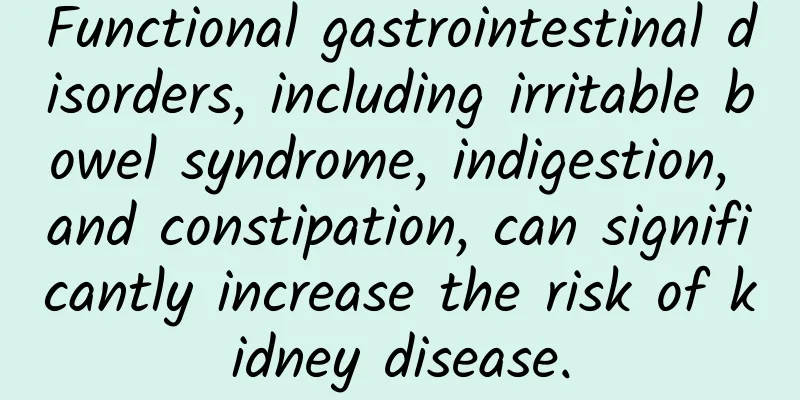Functional gastrointestinal disorders, including irritable bowel syndrome, indigestion, and constipation, can significantly increase the risk of kidney disease.

|
Functional gastrointestinal disorders (FGIDs) are a group of conditions characterized by chronic gastrointestinal symptoms such as abdominal pain, dysphagia, dyspepsia, diarrhea, constipation, and bloating, with no obvious pathological, anatomical, or physiological abnormalities on routine examination. The most common subtypes of FGIDs include irritable bowel syndrome (IBS) and functional dyspepsia. FGIDs are very common, with a global prevalence of 40%, accounting for 12% of primary care workload and 30% of gastroenterology outpatient consultations. Notably, psychiatric disorders such as depression and anxiety often coexist with FGIDs in clinical practice due to some common risk factors that affect the function of the gut-brain axis, including genetic, physiological, and psychosocial factors. As previous studies have shown that conditions such as depression and anxiety are positively associated with the risk of chronic kidney disease (CKD), we speculated that FGIDs may also be a risk factor for incident CKD, and the association between the two may be partially mediated by mental health . In order to verify the above hypothesis, the National Clinical Research Center for Kidney Diseases of Nanfang Hospital, Southern Medical University, carried out relevant work, and the research results were recently published in the Chinese Medical Journal . The study found that participants with FGIDs had a significantly increased risk of CKD, and this association could be partially explained by mental health scores. Professor Qin Xianhui of the National Clinical Research Center for Kidney Diseases of Nanfang Hospital, Southern Medical University is the corresponding author of the article, and Dr. Liu Mengyi is the first author. The study included more than 410,000 middle-aged and elderly participants from the UK Biobank study who did not have chronic kidney disease at baseline. Patients with FGIDs (including IBS, dyspepsia and other functional bowel disorders (mainly constipation)) were the exposed group, and non-FGID subjects were the non-exposed group. At baseline, 33,156 participants were diagnosed with FGIDs, including 20,987, 8,253, and 6,419 subjects diagnosed with IBS, dyspepsia, and other FIDs, respectively. During an average follow-up of 12 years, 11,001 participants were newly diagnosed with CKD. The study showed that: (1) Compared with participants without FGIDs, participants with FGIDs had a 36% increased risk of CKD, participants with IBS had a 27% increased risk of CKD, participants with dyspepsia had a 30% increased risk of CKD, and participants with other functional intestinal disorders (mainly constipation) had a 60% increased risk of CKD; (2) Mediation analysis showed that mental health scores mediated 9.05% of the association between FGID and CKD, and 13.97%, 8.27% and 5.63% of the association between IBS, dyspepsia and other functional intestinal diseases and CKD, respectively. (3) Among participants with a higher genetic risk of CKD, FGIDs and their subtypes had a stronger association with the risk of incident CKD (Figure 1). Figure 1 Association of FGIDs and their subtypes with the risk of CKD in subjects with different genetic risks of kidney disease In conclusion, this large prospective study showed that participants with FGIDs had a significantly increased risk of incident CKD, an association that could be partially explained by psychological health scores. Given the high prevalence of FGIDs, this study highlights the need and importance of monitoring the psychological status and renal function trajectory of patients with FGIDs. References: Liu M, He P, Ye Z, Yang S, Zhang Y, Wu Q, Zhou C, Zhang Y, Hou FF, Qin X. Functional gastrointestinal disorders, mental health, genetic susceptibility, and incident chronic kidney disease. Chin Med J (Engl). 2023 Sep 5. Editor | Liu Mengyi Wu Yiting Audit | Qin Xianhui |
>>: Pleural Friction Rub: Small Details with Big Impact
Recommend
What are the methods for pregnant women to relieve vomiting?
Some pregnant women have very obvious vomiting sy...
What are the causes and prevention methods of prolonged menstrual bleeding?
Menstruation is a normal way for every adult woma...
How to choose the solution for washing the genitals?
Women's reproductive health is a very importa...
What foods should not be eaten for lobular hyperplasia of the breast
For example, lobular hyperplasia is a relatively ...
Why are unmarried women called "virgins"?
People often refer to unmarried young girls as &q...
How long does it take to complete the flow?
After an abortion, you should rest in bed for 2-3...
Coffee-colored stuff flowing from lower body
There are more and more female friends suffering ...
The causes of sagging breasts in girls and what to do
My daughter is now in her youth. What are the rea...
The dangers of excessive amniotic fluid
Amniotic fluid is very important for both the fet...
Will abortion cause uterine prolapse?
Uterine prolapse is a condition in which the uter...
The benefits of menstruation for women
Menstruation is very important for women. Women b...
How to treat rare blood clots during menstruation
Many female friends do not develop good living ha...
Is the 9th day of menstruation a safe period?
Is the ninth day of the menstrual period a safe p...
What to eat for less menstrual flow
After women start menstruating during puberty, me...

![[Female Health] What should women eat to maintain their ovaries and uterus?](/upload/images/67ce225080947.webp)







